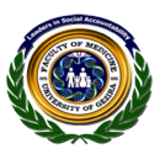
Training in the health professions in Sudan started at the dawn of the last century with the giant of the nascent/Sudan medical services. At that time it was confined to auxiliary health personnel: nurses, midwives (who were essentially traditional birth attendants who underwent a reorientation course), medical assistants and sanitary overseers. Medical education to graduate doctors did not start until 1924 when the Kitchener School of Medicine was established. Though the school had very close association with the medical services, it had its autonomous status. It was also modeled on traditional British medical schools and followed the curricula of these schools although the graduates were to serve in and promote the Sudan medical services. The Kitchener School of Medicine was later, in 1957, incorporated in the University of Khartoum and became the Faculty of Medicine. The close association with the medical serves became rather loose and the original objectives also blurred. It was not until 1976 that two new medical schools were established as faculties of new universities in Wad Medani (Gezira University), and Juba (Juba University). These two schools were originally destined to follow the tradition of other medical schools, especially the Faculty of Medicine, University of Khartoum. However various factors combined to make the Faculty of Medicine, University of Gezira distinct and unique in its approach to medical education. The most obvious factor was the status of the university itself, which states categorically that: "The University shall pursue the study The objectives of the faculty were identified as: To educate and graduate doctors with sound scientific knowledge, clinical skills and attitudes who were best suited to work in Sudan health services, especially rural areas. To participate actively in health delivery and promotion in all levels and to work closely and intimately with the central and regional health authorities to achieve the maximum integration possible in training, planning and service promotion. To engage actively in research in health problems, especially in rural areas; to identify these problems and search for solutions The approach of the Faculty is characterized by: Community orientation. Problem solving. Team working. Certain strategies in medical education to implement the programs are considered relevant and necessary to achieve these goals and objectives. These strategies are: The following six main strategies are adopted to help the school and students achieve the objectives of the curriculum: -Community orientation Community Based Education (CBE); part of the curriculum is learnt in the community Integration of basic, clinical and socio-behavioral sciences Problem-Based Learning (PBL) Team work Early exposure of students to clinical and community training Continuous evaluation. Partnership with related sectors.
Vision:
To achieve excellence in performance, graduates, research and to provide preventive and curative health service to promote the health of the society and participate actively in solving it’s health problems.
Future Vision
- Maintain the excellence that was achieved the Faculty of Medicine
- Introducing modern technology in teaching
- Continue development of curricula to meet the requirements of the modern era
- promote scientific research among faculty members
- Meet the needs of the implementation of educational programs
- Strengthen the spirit of teamwork between the faculty and the related sectors
- Strengthen the spirit of practical cooperation with national and international universities
- Rehabilitate training centers for students, such as hospitals and health centers
- Strengthen the partnership with the Ministry of Health to become more effective and invite other partners with financial ability
- Expand graduate studie, especially in subspecialties
- Expand students accommodation in the health sectors specially faculties of applied medicine and create new departments as required by the overall national strategy
- Strengthen the spirit of teamwork in the health services
- Strengthen sustain the partnership with the community
- Establish educational service and research centers affiliated to the University
Mission:
The mission of the FMUG joins that of Gezira University. Its main mission is to participate in the development of an innovative health profession education and practice, scientific research and community health services at an individual and social level.
The FMUG intends to graduate doctors who are able to maintain, improve and are able to work as a group and resolve health problems by allowing them to develop the necessary knowledge, skills and attitudes. The FMUG also continues to support specialization and continuous education and training of its graduates and staff. The FMUG intends to promote an interdisciplinary approach towards (health and well being) by establishing and maintaining co-operation between disciplines in the fields of education, research and services. It also aims at co-operation with health and related faculties in the U. of G. Through its educational , scientific and community involvements FMUG will be intimately connected with the health systems (at all levels) which enables the school to tune health policies and programmes. By supplying high level, fundamental and applied scientific research. As the FMUG wishes to participate in finding solutions to clinical, health services and community problems in the health sector. FUMG aims to provide solutions to health related needs, in particular those addressing priority community problems and high risk population, through sharing its experience regarding education, scientific research and health polices with local, regional and international bodies.

